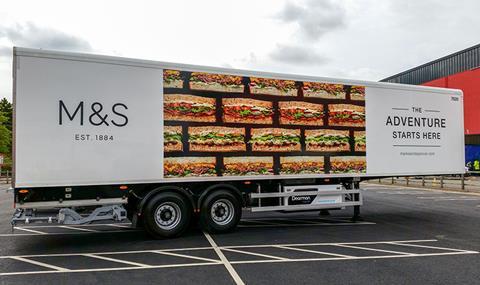
Marks & Spencer is to try out a liquid nitrogen-powered transport refrigeration unit (TRU) on one of its semi-trailers as part of its CO2-reduction strategy.
The zero-emission TRU, designed by clean cold technology firm Dearman, uses a liquid nitrogen-powered engine to operate the refrigeration system.
Dearman said its technology can reduce CO2 emissions by up to 95% compared with a conventional TRU powered by a secondary diesel engine.
The venture sees M&S lease a dual-compartment Dearman Hubbard TRU, on a refrigerated semi-trailer, to operate out of the retailer’s Hemel Hempstead depot.
M&S said it has a strong record with liquid nitrogen TRUs: it led the way with hundreds of Polarstream trailers 20 years ago, and has taken on 15 BOC Frostcruise units in the last four years.
Last year saw M&S use more than one million litres of liquid nitrogen.
The retailer will be examining the cost and environmental benefits of the Dearman technology ahead of a potential national rollout.
M&S last year launched its new sustainability strategy – Plan A 2025 – with renewed targets to reduce carbon emissions across the business. This follows its previous, 10-year Plan A strategy that saw it become a carbon-neutral retailer.
Anthony Whitehouse, M&S Fleet Engineer, said: “Dearman’s impressive liquid nitrogen technology has shown the kind of results it can achieve and we are excited to be partnering with them.
“Our latest sustainability plan is ambitious and includes bold new science-based target to further improve the efficiency of our operations. Our chilled delivery trucks have a role to play in that and we believe Dearman’s transport refrigeration unit could help us meet our emissions targets.”
Dearman CEO Scott Mac Meekin added: “We are delighted to be launching a partnership with a real heavyweight on the UK high street. Marks & Spencer is a trusted brand for the quality of its products and the company is clearly ambitious on the sustainability agenda.
“It wants to go much further in cutting the carbon dioxide emissions of its chilled deliveries and a Dearman transport refrigeration unit is uniquely placed to achieve that goal.”













